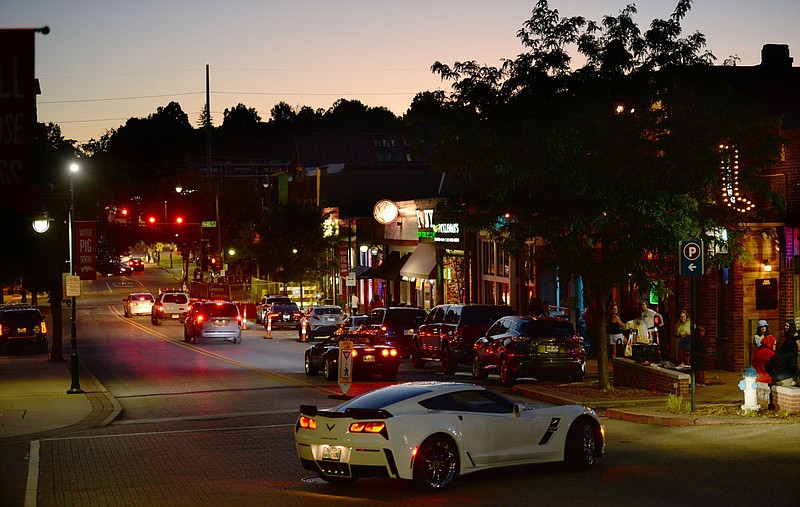FAYETTEVILLE -- The city's outdoor drinking area downtown will live on for at least three more years.
Just before 11 p.m. Tuesday, the City Council unanimously approved extending the sunset clause for its entertainment district downtown, known as the Outdoor Refreshment Area.
The district was set to expire at the end of the month. Devin Howland, economic vitality director, presented a proposal to the council to make the district permanent, saying it has served as a boon to downtown businesses, especially during the pandemic.
"While its original intent was about downtown place-making, it became clear very quickly this tool could be used to allow bars and restaurants to safely increase sales while adhering to social distancing measures," he said.
A state law enacted in 2019 lets cities allow outdoor possession and consumption of alcoholic beverages, but not serving. Cities are free to craft regulations that best suite them.
The pilot program for the Outdoor Refreshment Area kicked off in July. The boundary roughly covers Watson Street to the north, to East Avenue, to Mountain and Prairie streets to the south and West Avenue and Powerhouse Alley to the west.
People are allowed to buy drinks in compostable cups inside businesses and consume them outside within the Outdoor Refreshment Area boundary 10 a.m. to 10 p.m. daily. Cups can't be taken from one business to another, or be given to other people.
Howland said so far more than 200,000 cups have gone out the doors of 60 participating bars and restaurants.
Rather than make the district permanent, council members opted to extend the Jan. 30 sunset clause to April 30, 2024. Council member Teresa Turk said she worried if a business claimed to depend on the district for profit, and the council decided to take it away for whatever reason after making it permanent, the business could sue the city.
"In 2020, we had no idea we were going to have a pandemic. The world is unpredictable," she said. "If somehow this beautiful program that's been designed turns into a Bourbon Street, I want to be able to figure out a way we could kind of control that and reassess it. If we had this sunset provision, we would be able to do that."
City Attorney Kit Williams said there could be a slight risk if a business claimed to rely on the district. Subjecting the district to review ensures the council's ability to remain in control, he said.
"There are always inventive attorneys," Williams said.
Molly Rawn, chief executive officer of the city's tourism bureau, Experience Fayetteville, said she was glad to see the district continue for at least three years, but questioned the need for a sunset clause. The council can bring back or review or discuss any of its ordinances, and Rawn said she wasn't sure why the entertainment district would be different.
"I understand what they are trying to avoid by adding the sunset clause, but I don't think that is the only pathway," she said. "Ultimately this is a good thing for our city and I am glad the council supports it."
Council member Matthew Petty, a representative of Ward 2 covering downtown, voted against placing a sunset clause on the district. He said the district is right for the city and has proven to be exceedingly safe, as intended by the state Legislature. The downtown zoning has protections in place to prevent a Bourbon Street from happening, he said.
"Bourbon Street feels very alien to the Fayetteville experience," Petty said. "I don't think it'll happen here unless we have a City Council that's way different and encourages it or even pursues it."
The council also added provisions to the ordinance giving the mayor authority to make changes. For instance, the mayor could limit open consumption associated with certain events, or limit a business' ability to participate for violating provisions, or adjust the district's hours, Assistant City Attorney Blake Pennington said.
Stacy Ryburn can be reached by email at [email protected] or on Twitter @stacyryburn.

